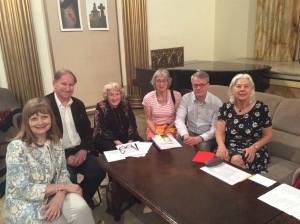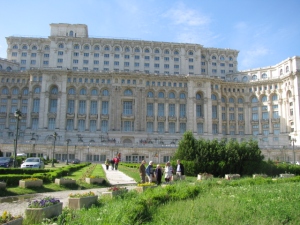I was really pleased to be invited to be part of a delegation of British poets visiting Romania in April. Part of my delight was because, although one of my daughters went there as a volunteer to help in an orphanage when she was a student, this was a country about which I knew  far too little. The other part of my delight was because I recognised that with such a lovely group of poets we were bound to have fun. The other poets were Maggie Butt, Katherine Gallagher, Jeremy Page, Peter Phillips and Anne Stewart. I had published Maggie and Anne as Oversteps poets, and was well aware of the fine reputation of the others.
far too little. The other part of my delight was because I recognised that with such a lovely group of poets we were bound to have fun. The other poets were Maggie Butt, Katherine Gallagher, Jeremy Page, Peter Phillips and Anne Stewart. I had published Maggie and Anne as Oversteps poets, and was well aware of the fine reputation of the others.
The visit was arranged by Lidia Vianu of the University of Bucharest Masters programme in Translation, and as the department was celebrating its tenth anniversary, celebration was in order. The idea was to spend four hours on each weekday morning at the Romanian Cultural Institute, working intensively with a group of students, and then to have a wide range of visits and special events in the afternoons and evenings.
 I was allocated 13 students and thoroughly enjoyed my time with them. For the second year students’ final assessment they had been translating Romanian poetry into English, and our task was to help them ensure that the English was perfect. One of the poets had used strict forms, mainly sonnets and rhyming couplets, and I occasionally felt there was a risk of losing some of the poetry by slavishly replicating the rhyme patterns, so some careful judgements had to be made.
I was allocated 13 students and thoroughly enjoyed my time with them. For the second year students’ final assessment they had been translating Romanian poetry into English, and our task was to help them ensure that the English was perfect. One of the poets had used strict forms, mainly sonnets and rhyming couplets, and I occasionally felt there was a risk of losing some of the poetry by slavishly replicating the rhyme patterns, so some careful judgements had to be made.
 Early in the week we were invited to a reception at the residence of the British Ambassador, Paul Brummell, who gave us a delightful evening, introduced us to a number of dignitaries and also delivered an intelligent and relevant talk.
Early in the week we were invited to a reception at the residence of the British Ambassador, Paul Brummell, who gave us a delightful evening, introduced us to a number of dignitaries and also delivered an intelligent and relevant talk.
At the end of the week the six of us led a discussion on Shakespeare at the British Council, and then gave a reading of our work.
 In between these two events, in just 72 hours, an anthology of our poems was translated into Romanian, edited and published ready for distribution at the final event. The
In between these two events, in just 72 hours, an anthology of our poems was translated into Romanian, edited and published ready for distribution at the final event. The book was called simply ‘Six British Poets’. Our poems were translated by Ioana Ieronim, and published by Integral Press, Bucharest. I’m pictured here with Ioana, the translator.
book was called simply ‘Six British Poets’. Our poems were translated by Ioana Ieronim, and published by Integral Press, Bucharest. I’m pictured here with Ioana, the translator.
In between these two official engagements, we had an enor mous amount of fun, and were looked after royally by our hosts. We had a memorable dinner at ‘Lacrimi si Sfinti’, the restaurant belonging to Mircea Dinescu. Mircea is one of the best-known Romanian poets, was very much involved in the Revolution against Ceausescu in 1989, and now owns a farm out in the country where he grows all the food
mous amount of fun, and were looked after royally by our hosts. We had a memorable dinner at ‘Lacrimi si Sfinti’, the restaurant belonging to Mircea Dinescu. Mircea is one of the best-known Romanian poets, was very much involved in the Revolution against Ceausescu in 1989, and now owns a farm out in the country where he grows all the food  and wine for his fantastic restaurant in Bucharest. Here he is pictured with his wife, Maria; and in the other picture you can see the band that entertained us as we ate.
and wine for his fantastic restaurant in Bucharest. Here he is pictured with his wife, Maria; and in the other picture you can see the band that entertained us as we ate.
Other highlights of the week included visits to various museums and to the Parliament Palace, the strange, over-sized palace constructed by Ceausescu, which he did not live to inhabit as he was executed more or less as the building was completed. No expense was spared in this palace, and although it may not be to everyone’s taste, it is certainly impressive.

We were all grateful to the generous funders, who contributed in various ways to make our visit so successful: the Romanian Cultural Institute, the University of Bucharest, the British Embassy and British Council, the Writers’ Union, the National Literature Museum and the Government. We also made many good new friendships while we were there, and were very happy when Elena Nistor, who guided us around many museums and other places of interest during the week, invited us to lunch at her mother’s on the final day. Another rich experience was spending half an hour at a service in one of the many beautiful churches on the Orthodox Palm Sunday.
Above all we are deeply grateful to Lidia Vianu, who runs both the MA in Translation and also  the Contemporary Literature Press, for organising such an amazing week for us, and looking after us so well. She, and others, are now engaged in producing another book, which will include some of the work done by the students, as well as more of our poems.
the Contemporary Literature Press, for organising such an amazing week for us, and looking after us so well. She, and others, are now engaged in producing another book, which will include some of the work done by the students, as well as more of our poems.
A final comment about Bucharest itself: as well as being impressed by many of the older buildings we saw, we were thrilled by the presence of so many trees, both in parks and along the roadsides. It was because of the presence of so much woodland that we had the pleasure of hearing birdsong each day, even within the confines of the city.
